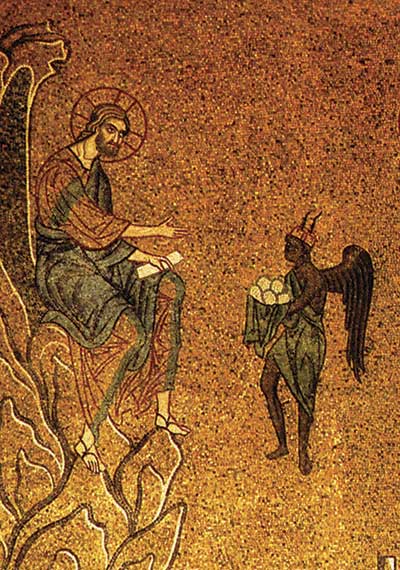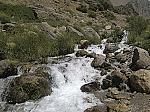Lent Week One

[Above: Temptations of Christ (mosaic in basilica di San Marco)—Anonymous / public domain, Wikimedia]
First Sunday
The LORD brought us out of Egypt with a mighty hand and an outstretched arm, with a terrifying display of power, and with signs and wonders; and he brought us into this place and gave us this land, a land flowing with milk and honey.
(Deuteronomy 26:8–9)
The tempter came and said to him, “If you are the Son of God, command these stones to become loaves of bread.” But he answered, “It is written, ‘One does not live by bread alone, but by every word that comes from the mouth of God.’”
(Matthew 4:3–4)
Now after John was arrested, Jesus came to Galilee, proclaiming the good news of God, and saying, “The time is fulfilled, and the kingdom of God has come near; repent, and believe in the good news.”
(Mark 1:14–15)
Monday, First Week of Lent
Dearly beloved, today you are invited to take a walk into the wilderness, to behold, sympathize with, and get instruction and comfort from a Savior tempted. In the conflict, he approves himself to be God’s beloved Son; and the Father gives demonstrable evidence, that with, and in him he is indeed well pleased.
—George Whitefield (1714–1770), “The Temptation of Christ”
Dearly beloved,” begins George Whitefield, “today you are invited to take a walk into the wilderness.” If this were an invitation to a backpacking trip in a beautiful mountain wilderness, I’d like to take him up on it. But instead Whitefield invites us to join Jesus in the wilderness of temptation. This is not the wilderness of stunning scenery that makes our heart delight in the awe of God’s creation. Rather, this is a barren wilderness; not the mountain-top highs of faith but the low ebbs of feeling alone, hungry, uncertain, and desperate.
We’re invited to join Jesus there. We’re invited to find comfort from Jesus there, when our soul is thirsty and we’re at the end of our rope. We’re invited to watch and see how Jesus stands up to temptation, reciting the Scripture that he has hidden in his heart and feeding on God’s word rather than physical food.
As we journey into Lent, Jesus and his followers who’ve gone before us invite us on a journey that will not be fun or easy. But don’t be discouraged. Look at Jesus. With him recall your baptism. Can you hear God speaking over you, “You are my beloved daughter. You are my beloved son. With you I am well pleased”?
After 40 lonely days of fasting in the wilderness, I can only imagine that Jesus clung to those words with all his being. As you enter into Lent and walk into the wilderness, I invite you to cling to those words with Jesus. Whatever you encounter in the weeks to come, remember that you are God’s beloved child.—by Michelle Curtis
Tuesday, First Week of Lent
Thus since we were weak, the Wisdom of God made Itself weak, when the Word was made flesh, and dwelt in us, that we might hope under His wings.
—Augustine of Hippo (354–430), Exposition on the Book of Psalms
Augustine led an unruly and intellectually prideful youth. The only things that kept him from complete self-destruction, he said in hindsight, were the prayers of his faithful Christian mother, Monica.
For nine years Augustine followed the Manichaean heresy, but then he came under the influence of a bishop named Ambrose, who showed him how Christian faith is intellectually respectable. Ambrose and several other Christian friends also pressed Augustine on his sinful lifestyle—especially his problem with lust.
The day of Augustine’s conversion began ordinarily enough. He was staying in a villa with Monica and his friend Alypius. A visitor dropped by—an officer of the imperial household called Pontitian, an African Christian. They sat down to talk, and Pontitian saw the epistles of Paul lying on the table. Delighted, he spoke of his own conversion, the monastic life, and the father of monasticism, Antony of Egypt.
Just hearing about such a man as Antony pierced Augustine to the heart. When Pontitian was gone, Augustine said to Alypius, “Simple men take heaven by violence, but we, heartless and learned—see how we wallow in flesh and blood! Are we ashamed to follow because others have gone before?”
Augustine left the house; Alypius followed him closely, perhaps afraid his friend would harm himself. In the garden Augustine heard a child’s voice chanting “Take up and read.” He opened the letters of Paul to a passage in Romans that challenged him to put aside his lustful habits and “put on the Lord Jesus Christ.” Stricken, his last resistance to the gospel at last stripped away, Augustine gave in and gave his life over to Christ.
Since we are weak, Augustine says, the Word of God meets us where we are. As with Augustine, when we are at our worst, God embraces us with his grace and will not let us go.—by Chris R. Armstrong
Wednesday, First Week of Lent
The Devil places us on high places by exalting [us] with pride, that he may dash us to the ground again.
—Glossa Ordinaria (a 12th-c. collection of patristic and medieval biblical commentary)
Imagine a social media post. The post itself is a verse of Scripture. The flowing comments beneath show dates hundreds of years apart, with surprising levels of careful, theologically grounded interpretation. Among the commenters are Augustine and Ambrose. If the best of these comments were edited and published in their own right, they would be exactly what the Glossa Ordinaria was in the Middle Ages. Published around 1150, it summarizes centuries of the interpretive marginal notes found in the Bibles of scholastics, saints, and scribes throughout Christendom; it became the standard textbook for how to interpret Scripture for generations.
This particular quote is a gloss (interpretive comment) found beneath Matthew 4, in which the devil sets Jesus on the height of the temple and challenges him to jump off, empoying the angelic bodyguards mentioned in Psalm 91 to soften the impact. Jesus responds, quoting Deuteronomy: “You shall not put the Lord your God to the test.”
Jesus needed no assurances from angels of his closeness with the Father, nor, as Paul put it, did he “count equality with God a thing to be grasped” (Phil. 2:6). Rather Jesus defeated the devil through his humble confidence in his Father’s love, even in the words of the Father spoken at his baptism right before being driven into the wilderness: “This is my beloved Son, with whom I am well pleased” (Matt. 3:17).
In our wildernesses, on the high, precarious places, God is close to us. This closeness is not something to bargain against our circumstances with, as if it gives us in ourselves some superhuman power. Rather it is the place to stand when all else is unsteady. We do not trust in God to get us out of sticky situations or seasons of darkness in this life; but we trust in the Father because, like Christ and through Christ, we know that his love is all we need for salvation.—by Max Pointner
Thursday, First Week of Lent
Now, the temptation put before Christ was to seek the inheritance God has promised his children elsewhere than in God.
—John Calvin (1509–1564), Commentaries
It was a problem I knew I had before the pandemic started, but it took a worldwide crisis to reveal I’d been seeking comfort in an unhealthy place: sugar. Sweets offered an easy fix, but in reality, they made me both physically and spiritually sick. Sugar, it turns out, can’t deliver on its promises.
Maybe that scenario sounds familiar. Isn’t it just like us to seek out satisfaction everywhere other than in the One who can actually deliver it? When we feel empty, we fill it with food or entertainment or busyness instead of the life-giving words that come from our Father. When we are afraid or anxious, we first seek control over uncontrollable circumstances instead of seeking the promises we inherit in Christ. When we are weary, grieved, or burned out, we resist finding our rest in him.
The Bible tells us Jesus experienced some of these same emotions in the desert. He walked the desolate places; he was hungry, tired, and uncomfortable, both spiritually and physically. And that is when Satan whispered to him—at his weakest—as he so often does to us.
The difference is that Jesus, the perfect Son of God, remembered the inheritance the Father promised. He overcame the tempter in the wilderness, and ultimately he crushed Satan’s head at the empty tomb.
Today I encourage you to look to Jesus, “forgetting what lies behind and straining forward to what lies ahead” and pressing “on toward the goal for the prize of the upward call of God in Christ Jesus” (Phil. 3:13). Our inheritance in him is sweeter than honey (or sugar) and more precious than anything the tempter can promise.—by Kaylena Radcliff
Friday, First Week of Lent
Lord, who throughout these forty days
For us didst fast and pray,
Teach us with Thee to mourn our sins,
And close by Thee to stay.
—Claudia Hernaman (1838–1898), Child’s Book of Praise
Both the story of Jesus’s tempting by Satan and the season of Lent evoke the traditional Christian practice of pilgrimage. Pilgrimages are spiritual journeys during which we leave behind comforts, incur costs, face difficulties, and endure disciplines. Christians undertake pilgrimages to encounter God in a more direct way.
In the story of Christ in the desert, we see him face Satan’s challenges. We see him wrestle with those challenges, marshaling his resources and his wisdom to fight his enemy. And his responses are consequential—they take him in one direction and not in another. Like Christ we Christians succeed not by fixing our sight on an abstract philosophy or a fixed law, but by clinging to our Father God.
As we face temptations along our pilgrimage, we turn to One who is stronger than we are. It is this exercise of personal trust, not merely giving cognitive assent or living according to law, that constitutes our faith.
Lent magnifies this truth: we are designed to need and enjoy created goods, but we are also often tempted to love those goods inordinately and to sin in securing them for ourselves. To Satan’s “tell these stones to become bread” (the use of illegitimate means to satisfy our bodies’ legitimate needs), we are to respond by looking higher than those needs—to the very word of God. Jesus teaches us to trust that, as we seek first the kingdom of God and righteousness, those needs will be taken care of as well. This is one meaning of the Lenten practice of fasting.
If we make ourselves comfortable in our own little worlds, separated as they inevitably are from God, we end up walling ourselves off from the grander, if more difficult, experiences of pilgrimage. Ultimately we wall ourselves off from our real home with God in a renewed heaven and earth.—by Chris R. Armstrong
Saturday, First Week of Lent
Jesus began to preach in Galilee, after . . . John was put in prison. If some be laid aside, others shall be raised up, to carry on the same work.
—Matthew Henry (1662–1714), Concise Commentary on the Bible
I grew up hearing stories of missionaries from all around the world and throughout every time in history, from Phillip the disciple to those sent out by my own home church. As I reflected on this quote by Matthew Henry, I thought of many instances when someone was doing wonderful work for the Lord that had to be continued by another after they died.
For example Elizabeth Elliot continued ministry in Ecuador after her husband was murdered; Corrie Ten Boom taught women in her cell at Auschwitz about the Bible after her sister Betsy died. Why do people continue doing the work of another before them? Dr. Esau McCaulley, professor of Bible and Theology at Wheaton College, answered my question so simply, yet so poignantly, “John the Baptist had his critique of those involved in structural oppression of the poor, and he offered particular actions of repair, but also made it clear that he was not the solution to their problem. One greater was on the horizon: the Messiah Jesus.”
In ministering to others, we have the opportunity to point to Jesus and reflect him to the world through our love for one another. When God’s people are doing his work, Jesus is always on the horizon.—by Kellie Mitchell
By CHI Staff and Associates
[Christian History originally published this article in Christian History Issue #143+ in 2022]








